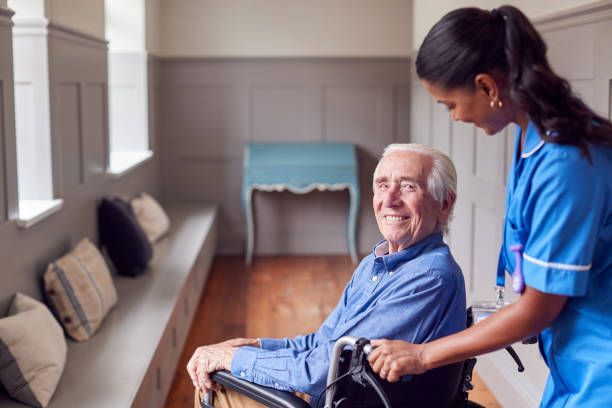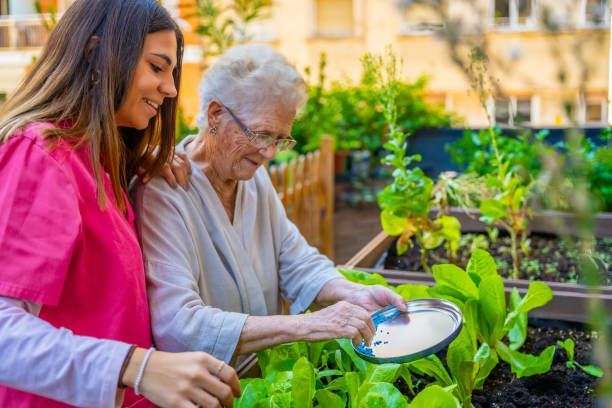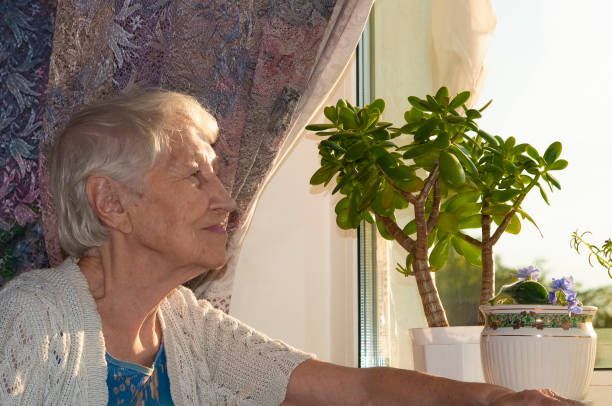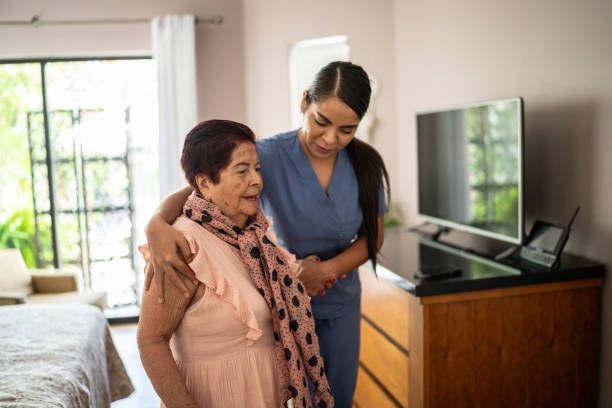Providing the Same Level
of Care We Expect for
Our Own Family
10 Tips for Celebrating the Holidays with an Elderly Loved One
A recent AARP study found that 28 percent of U.S. adults ages 50 and older report that they've felt lonely during a holiday season over the past five years, and nearly half (43%) have worried about a friend or family member who was lonely during the holidays.

As the holiday season approaches, ensuring that an elderly loved one receiving home care experiences a warm and joyous celebration becomes a primary focus. At 7 Day Home Care, we understand the importance of creating a festive and inclusive environment that promotes emotional well-being and fosters a sense of belonging for our cherished clients. With this in mind, we have compiled a thoughtful set of tips designed to enhance the holiday experience for elderly individuals receiving home care, emphasizing the significance of maintaining cherished traditions, fostering meaningful connections, and promoting a sense of gratitude and joy during this special time of year.
- Plan ahead: Coordinate with the home care team to ensure all necessary preparations are made for the celebration. Planning ahead with a home care agency for the holidays involves effective communication and coordination to ensure that your loved one receives the necessary care and support during this special time. Here are some steps you can take:
- Early communication: Reach out to the home care agency well in advance to discuss your plans for the holidays and any specific arrangements that may be required.
- Assess care needs: Review your loved one's care plan with the agency to determine if any adjustments or additional support are needed during the holiday period.
- Coordinate schedules: Coordinate with the agency to ensure that the caregiver's schedule aligns with your family's holiday plans, considering any potential changes in routine or timing.
- Plan for medication management: Discuss the management of medications with the agency, ensuring that there is a plan in place for timely administration and any potential adjustments to the medication schedule during the holiday season.
- Discuss dietary requirements: Communicate any special dietary requirements or preferences to the agency, allowing them to plan meals and ensure that your loved one's nutritional needs are met during the holidays.
- Arrange transportation if needed: If there are plans for outings or appointments during the holidays, coordinate with the agency to arrange transportation and ensure that your loved one can attend events or gatherings as desired.
- Emergency preparedness: Review emergency protocols with the agency to ensure that they are fully equipped and prepared to handle any unexpected situations that may arise during the holiday period.
By proactively discussing these aspects with the home care agency, you can effectively plan ahead and ensure that your loved one receives the necessary care and support, allowing them to enjoy a safe and joyful holiday season.
2. Create a festive atmosphere: Decorate their living space with seasonal decorations to bring a joyful ambiance to their surroundings. More, creating a festive atmosphere during the holidays for an elderly loved one can involve several heartwarming gestures to evoke joy and warmth. Consider decorating their living space with twinkling lights, fragrant seasonal flowers, and cherished ornaments, infusing the surroundings with a sense of holiday magic. Engage their senses by playing soft, familiar holiday music that may evoke fond memories and encourage a cheerful ambiance. Introduce the comforting aroma of holiday baking or traditional dishes, providing a sense of nostalgia and familiarity. Encourage the presence of loved ones and friends, fostering a supportive and inclusive environment that emphasizes the spirit of togetherness and love during this special time of year.
3. Involve them in the preparations: Encourage their participation in simple holiday tasks to foster a sense of inclusion and contribution. Involving an elderly loved one in preparations for the holiday season can be a meaningful way to create a sense of connection and joy. Encourage their participation in simple yet meaningful tasks, such as crafting homemade decorations, wrapping presents, or sharing cherished family recipes. Engage them in heartfelt conversations about past holiday traditions, allowing them to impart wisdom and share their treasured memories. Emphasize the importance of their contributions, fostering a sense of purpose and inclusion that can uplift their spirits and promote a feeling of belonging within the family. By actively involving them in the holiday preparations, you can create a sense of togetherness and shared joy, making the season more meaningful and memorable for everyone involved.
4. Respect their routine: Be mindful of their care schedule, medication, and dietary needs while planning activities for the day. Respecting and recognizing an elderly loved one's routine during the holiday season is crucial for maintaining their comfort and well-being. Acknowledge their established daily schedule and personal preferences, ensuring that holiday activities and festivities do not disrupt their sense of familiarity and stability. Offer them the opportunity to participate in celebrations at their own pace, allowing them to engage in activities that align with their energy levels and comfort. Respect their need for rest and relaxation, providing a quiet space where they can retreat and recharge when necessary. By honoring their routine and preferences, you demonstrate a deep understanding of their needs and a genuine commitment to their physical and emotional well-being during the holiday season.
5. Prepare special meals: Consider their dietary requirements and preferences when planning holiday meals to make the occasion feel special and inclusive. Preparing a special meal for an elderly loved one during the holiday season is a thoughtful way to show your affection and create a memorable dining experience. Take into account their dietary needs and preferences, incorporating familiar flavors and textures that evoke a sense of comfort and nostalgia. Consider preparing traditional dishes that hold sentimental value, incorporating seasonal ingredients that are both flavorful and nutritious. Pay attention to any specific dietary restrictions or modifications, ensuring that the meal is not only delicious but also tailored to support their overall health and well-being. By crafting a special meal with love and consideration, you can create a meaningful culinary experience that celebrates the spirit of togetherness and the joy of the holiday season.
6. Share stories and memories: Take the time to reminisce and share cherished memories, creating an atmosphere of warmth and nostalgia. Sharing memories and stories with an elderly loved one during the holiday season can foster a heartwarming sense of connection and nostalgia. Encourage them to reminisce about past holiday traditions and cherished moments, allowing them to recount their experiences and share the wisdom gained from a lifetime of memories. Create a welcoming and attentive atmosphere that promotes open dialogue and genuine engagement, expressing a sincere interest in their personal journey and the valuable lessons they've learned along the way. By actively listening to their stories and acknowledging the significance of their experiences, you demonstrate a deep appreciation for their life's narrative, fostering a bond that transcends generations and embraces the spirit of love and familial unity during this festive time of year.
7. Engage in festive activities: Organize light-hearted activities like watching holiday movies, playing games, or enjoying seasonal music together. Engaging in festive activities with an elderly loved one during the holiday season holds great significance in fostering a sense of joy and togetherness. Encourage them to participate in light-hearted activities such as decorating the Christmas tree, crafting handmade ornaments, or enjoying classic holiday movies together. Embrace the spirit of tradition by involving them in baking seasonal treats or sharing in the joy of exchanging small, thoughtful gifts. Through these shared experiences, you can create a nurturing environment that promotes emotional well-being and cultivates a sense of belonging, allowing your loved one to feel cherished and included in the heartwarming celebrations of the holiday season.
8. Facilitate virtual connections: Arrange video calls with distant relatives and friends to allow them to feel connected and involved in the celebrations. Facilitating a virtual connection with loved ones during the holiday season holds significant importance in fostering a sense of emotional closeness and inclusivity, especially for elderly individuals. Arrange video calls with distant family members and friends, enabling them to participate in the joyous holiday celebrations and feel the warmth of familial bonds from afar. Encourage the sharing of heartfelt conversations, stories, and laughter, promoting a sense of belonging and connection that transcends physical distance. By embracing technology to bridge the gap between loved ones, you can create a meaningful and memorable holiday experience that emphasizes the spirit of love, unity, and togetherness, even across the miles.
9. Exchange thoughtful gifts: Offer meaningful presents that cater to their interests and hobbies, showing them that they are cherished and remembered. Exchanging a thoughtful gift with an elderly loved one during the holiday season holds immense importance in conveying affection and fostering a sense of appreciation and connection. Choose a gift that reflects their interests, hobbies, or cherished memories, demonstrating a heartfelt understanding of their unique preferences and personality. Consider personalized keepsakes, nostalgic mementos, or items that promote comfort and well-being, emphasizing the thought and effort put into selecting a meaningful present. By exchanging a thoughtful gift, you can express your gratitude for their presence in your life and create a lasting token of love that evokes warmth and fond memories, enriching the holiday season with heartfelt gestures of care and affection.
10. Foster a sense of gratitude: Encourage moments of reflection and gratitude, emphasizing the importance of being together and appreciating the joys of the holiday season. Fostering a sense of gratitude with an elderly loved one during the holiday season can enrich the spirit of togetherness and cultivate a deeper appreciation for life's blessings. Encourage moments of reflection and mindfulness, prompting them to express gratitude for the simple joys and meaningful experiences that have enriched their journey. Create an atmosphere of warmth and appreciation by highlighting the significance of familial bonds, shared memories, and the comfort of being surrounded by loved ones. By fostering a sense of gratitude, you can instill a profound sense of contentment and fulfillment, nurturing a positive outlook that uplifts the spirit and encourages a heartfelt embrace of the joyous moments that the holiday season brings.
Our team at 7 Day Home Care remains dedicated to ensuring that our elderly clients continue to experience a sense of comfort, joy, and companionship throughout the year. By embracing the spirit of togetherness and fostering an environment of warmth and care, we strive to create lasting memories that bring comfort and happiness to our clients and their families. As we look forward to the holidays, we remain committed to providing compassionate and personalized care that honors the unique needs and preferences of each individual, cultivating an atmosphere of support and understanding that extends well beyond the holiday season.
Brian Callahan
7 Day Home Care









Long Island Location
Hours of Operation
We are Open 24 Hours a Day
7 Days a Week
Contact Us



Share On: